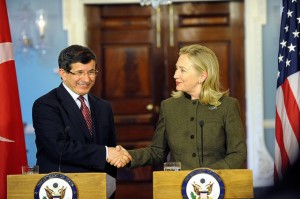
US Secretary of State Clinton and Turkish Foreign Minister Davutoğlu (Image courtesy of State Department)
With the recent downing of a Turkish F-4 fighter jet by Syrian forces and reports of shots being fired at a Turkish rescue plane, there is a growing possibility of a military confrontation between the two countries.
Ankara said the incident “will not go unpunished,” but they do not intend to go to war with Syria. However, Turkish PM Erdoğan declared “the rules of engagement for the Turkish Armed Forces have changed” and military action will be taken against any “element that approaches the Turkish border from Syria in a way that may pose a risk or danger.”
Damascus described the incident as an act of self-defense and warned against retaliation.
Turkey invoked Article 4 of the NATO Charter, which calls for the members to convene to “consult” on a situation where a country feels its independence or security are being threatened. Ankara said it would ask NATO to invoke Article 5 of the charter, which says that “an armed attack” on any member nation shall be considered an attack on all members. Although this did not happen, it is important to remember that this is the second time Turkey has signaled that it might try to use Article 5.
After the meeting Tuesday NATO came out in strong support of Turkey, despite unanswered questions about the true mission of the Turkish plane.
“The security of the alliance is indivisible, we stand together with Turkey in the spirit of strong solidarity. We consider this act to be unacceptable and condemn it in the strongest terms.” – NATO Secretary-General Rasmussen
So where does all this leave the United States?
The United States has a responsibility to support Turkey, as it is a member of NATO and a crucial American ally. If NATO invokes Article 5 at Turkey’s request, the United States will have no choice but to come to Turkey’s aid. The US does have the choice to intervene without NATO and can also work to keep Turkey from asking NATO to intervene.
Many commentators have said military intervention would be disastrous for America, saying we do not need to become involved in another military conflict, especially this one, for multiple reasons.
Our wars in Afghanistan and Iraq have cost too much money and too many American lives.
Syria is not Libya. Syria’s airpower capabilities make it impossible for a limited strike operation. There is even speculation that Syria’s air defenses are stronger than those of Iran.
Intervening in Syria will provoke Iran (and probably Russia).
Experts have said that the conflict is likely to turn into a drawn-out civil war, and if the US intervenes it could become ensnared in a long-term conflict.
Based on this evidence, the conclusion is that any US military intervention would have a huge price tag and potentially catastrophic repercussions.
The US needs to continue voicing support for Turkey publicly, but should be, and most likely is, urging Ankara to not try to invoke Article 5.
Turkey has said it will not act without the support of the international community. Washington needs to use this as a tool to help suppress and avoid Turkey’s calls for military retaliation. The administration should use its influence in NATO to urge members to continue to oppose invoking Article 5 (at this point), especially since nothing Syria has done so far constitutes “an armed attack” on Turkey.
However, if the situation between Turkey and Syria continues to deteriorate, military action may be unavoidable. In NATO’s 63-year history, Article 5 has only been invoked once: by the United States in the aftermath of the September 11th attacks.
If Article 5 is invoked, America (and NATO) should consider non-military options under the part of Article 5 that states member nations will assist the attacked nation with “such action as it deems necessary, including the use of armed force.” Article 5 does not automatically mean military action and technically it does not bind the United States to provide military assistance.
If Turkey becomes embroiled in an armed conflict with Syria, the United States would be expected to become involved militarily. Not doing so could severely harm the relationship with Turkey. The question, then, changes. Which would be worse: harming the relationship with Turkey or getting involved in another drawn-out conflict?


